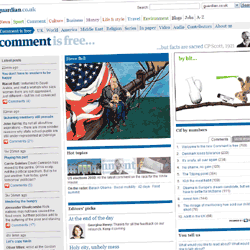 A big day for the Guardian today, as the new community-enabled Comment Is Free makes its debut. Site editor Georgina Henry describes the various mechanical and presentational changes, but one in particular catches my eye.
A big day for the Guardian today, as the new community-enabled Comment Is Free makes its debut. Site editor Georgina Henry describes the various mechanical and presentational changes, but one in particular catches my eye.
Each user of the site now has a personal profile page… featuring an ‘instant archive’ of all the comments they’ve added to Cif articles. It’s the realisation of the ‘blog of comments’ concept I described a year ago, prior to the launch of the Telegraph’s own blogging platform:
Every time I add a comment to a Telegraph news story (for example), it would get aggregated on a ‘personal profile’ page… in other words, a de facto ‘news blog’. You automatically see the headline (and first paragraph?) of the story I commented on, followed by what I thought. It lets me write what is effectively a news-driven blog, but does a lot of the copy-and-paste work for me.
The presentation of these profile pages is pretty dreadful. It’s little more than a few lines of metadata, followed by something resembling search results. No customisation options, no uploaded ‘buddy icons’, no RSS feed per user*, no in-profile navigation (other than pagination), no sort options.
So there’s a very long way to go before these profiles become recognised as ‘blogs’. But make no mistake, that’s what they are. It’s blogging without the overhead, and it ties the blogger ever closer to the Guardian brand and site (whose primary navigation Cif now shares).
* In fact, the new Cif’s lack of RSS overall is a real shame. Cif’s biggest problem is that there’s just too much of it. A single RSS feed, covering all topics, isn’t much help. I really hope these are a feature of the topic-based ‘subsites’ Georgina refers to. They’re getting RSS and subject filtering so right elsewhere on the Guardian site… but Cif needs it more than any other section.